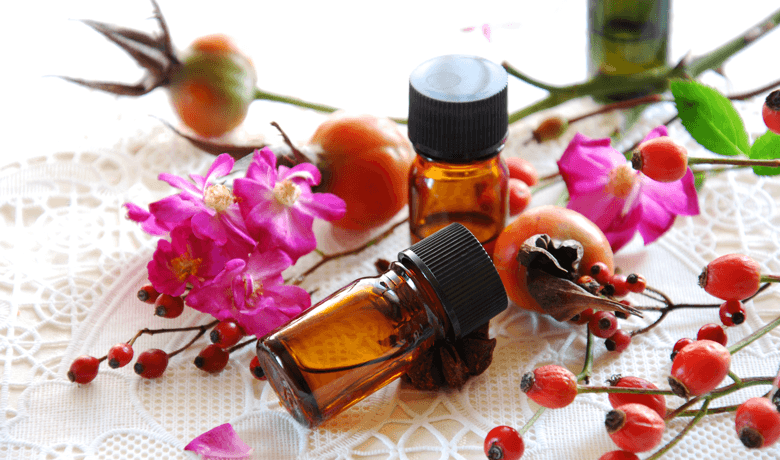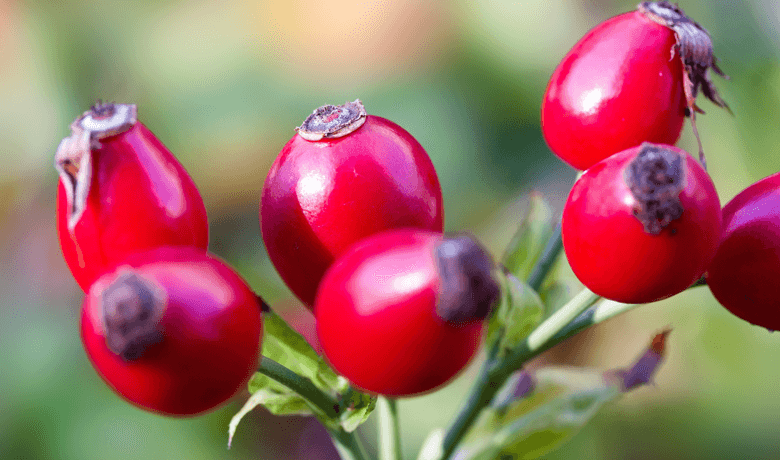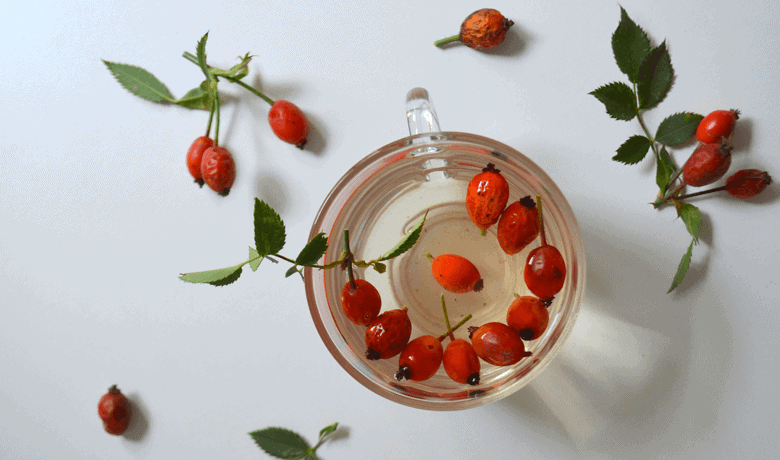Beautiful skin would be a dream come true.
Wouldn’t it?
Flawless youthful skin, free from blemishes uneven texture…Imagine!
The harsh reality is that skin conditions such as acne affect over 50 million Americans each year. Millions more suffer from scars, stretch marks, and many other skin ailments.
Conventional skin care often products contain harsh cleansers and toxic ingredients. In an effort to reduce exposure to these chemicals, lots of health conscious people just like you are looking into more natural alternatives.
One of the most popular options at the moment, especially for acne treatment is rosehip oil.
If you’ve been wondering does rosehip oil give you beautiful skin? and can rosehip oil cure acne and get rid of scars? then you’ve found the right place.
This article looks at traditional uses of rosehip oil, it’s benefits, applications for skin and healing, as well as current research and clinical studies.
We examine how it lives up to its growing reputation and also compares to the super popular coconut oil. Finally, we also show you different ways of using rosehip oil, what to look for when buying, and how to store it for optimal shelf-life.
Read on if you’re curious how rosehip oil can benefit your skin, naturally!
What is acne?
Acne vulgaris is disease caused by the bacteria Propionibacterium acnes (P. acnes). Its most common symptoms include pimples, blackheads, and bumps.
Acne is the most common skin disease. Unfortunately, in extreme cases, it can have terribly devastating effects including facial disfigurement, scarring and emotional trauma.
This condition is very common amongst adolescents because of their changing hormones. To make matters worse, teens who have bad cases of acne are more likely to suffer from anxiety, depression, social awkwardness and aggression than those with clear skin. Acne is also the second highest cause of suicide amongst teens suffering from skin conditions.
Acne occurs when skin follicles, (what we know as pores) get blocked. Pores get clogged by a mixture of too much oil, dirt, leftover makeup, or skin sensitivities. This blockage leads to an increase in oil (sebum) and bacteria production. The build-up of P. acnes bacteria in the pores causes inflammation which leads to the development of painful skin eruptions and pimples.
Some other factors that can influence the occurrence of acne are: hormones, diets (especially those with lots of highly processed or sugary foods), makeup products, comedogenic oils, genetics, previous infections, vitamin B supplements, and linoleic acid deficiency.
Summary
Acne is a common skin disease caused by the Propionibacterium acnes bacteria.
How common is acne?
Acne starts appearing with puberty and can continue until people are in their 40s and 50s. Despite it being a disease, it’s not a contagious condition.
According to the American Academy of Dermatology, acne affects upwards of 50 million people per year in the United States. Treatments for this condition cost the nation upwards of USD $3 billion.
Acne ranges in severity from small blackheads to large infected pimples or cysts on the face, back, shoulders, and chest areas. Untreated acne can lead to severe scarring and in extreme cases, disfigurement. And although both men and women can develop the disease, men generally experience more severe cases.
Many people go to extreme measures to try to treat the condition themselves. Most popular acne products contain harsh cleaners, abrasive scrubs, drying toners, and oil stripping chemicals.
For those with severe cases, prescription medication is often administered. Commonly prescribed treatments can include taking oral contraceptives (birth control pills) to regulate hormones, antibiotics, and products such as benzoyl peroxide.
Summary
Acne affects over 50 million people in the United States each year. Commonly used products and prescriptions involve the use of harsh chemicals, hormone treatment, and antibiotics.
What is rosehip oil?
Rosehip oil or rosehip seed oil as it is sometimes called has been used for thousands of years in beauty and healing practices.
Native to Chile, the flowering rose bush Rosa aff. Rubiginosa produces seed packed buds that have been revered by the ancient Egyptians, Mayans, and Native American peoples because of its incredible healing qualities. The buds appear after the flowers have dropped their petals at the end of their growing season.
Rosehip oil has recently become increasingly popular in the beauty industry. It’s been marketed as a safe and effective treatment for many skin conditions including acne scars, stretch marks, and aging skin.
Rosehip oil, not to be confused with its aromatic cousins rose oil and rose water, certainly lacks in the perfume department. Though it cannot compete in the aromatherapy arena, rosehip oil certainly makes up for its bland smell with its numerous health and beauty benefits.
The tiny droplets of clear to amber coloured oil are revered like liquid gold in the cosmetic industry because of their nutrient-packed cell regeneration properties.
Rosehips contain lots of Vitamin C, Vitamin E, unsaturated fatty acids, as well as powerful phytonutrients. These fruits are also rich in anti-inflammatory and antioxidants agents.
Summary
Rosehip oil is a natural product extracted from the fruit of a flowering rose bush. It has been used for thousands of years in healing and beauty treatment because of its high concentration of vitamins, nutrients, and healing compounds.
Rosehip oil for acne and scars
Rosehip oil works by replenishing moisture to the skin while improving elasticity and cell regeneration. It’s non-greasy, won’t clog pores, and absorbs quickly into the skin without leaving a heavy glossy finish like coconut oil for example.
It’s packed with phytonutrients, polyunsaturated fatty acids such as linoleic acid (54.05%), linolenic acid (19.37%), and phytosterols (mainly β-sitosterol (82.1%)). These compounds aid in the repair of damaged tissue and replenish skin cells.
Specialists such as Dr. Jessica Krant, assistant clinical professor of dermatology at SUNY Downstate Medical Center and one of New York City’s top dermatologists have spoken out on the benefits of rosehip oil for skin.
Dr. Krant explains: “Rosehip oil, also known as rose hips oil, is a light, absorbable oil that has shown benefits for both the face and scalp. It contains beta carotene, or vitamin A, which is known to help promote a healthy skin cell lifecycle, as well as antioxidant and anti-inflammatory components.”
Recent studies in Portugal have also demonstrated the value of rosehip oil in alternative healing practices. Their research showed that the high levels of antioxidants present in the rosehips show great promise to reduce the rate and effects of the aging process while also preventing cancer, heart disease and other oxidative-stress conditions.
Studies have even found that rosehip products are effective at reducing painful symptoms of rheumatoid arthritis without the unpleasant and dangerous side effects associated with conventional treatments. Rosehip has also been found to be an effective natural treatment for chronic lower back pain.
Rosehips are also used for anti-inflammatory products for both humans and pets.
Summary
Rosehip oil is highly beneficial for skin regeneration because of its high concentration of phytonutrients such as linoleic and linolenic acid.
Why is rosehip oil good for acne and acne scars?
Instead of using harsh abrasive chemicals and peels on their faces, many people have turned to rosehip oil as a safe, natural, skin treatment.
As noted, rosehip oil is packed with lots of nutrients, anti-inflammatory compounds, and antioxidants.
It also contains linoleic acid which can be highly beneficial in treating skin conditions such as acne.
Rosehip oil also inhibits MMP-1, an enzyme responsible for destroying collagen. The destruction of collagen in skin cells leads to wrinkles, reduced evenness and accelerates the aging process.
Unlike coconut oil which blocks pores and can actually cause acne, rosehip oil is non-comedogenic. It adds hydration, stimulates cellular repair and soothes inflammation without clogging pores and causing breakouts. This helps clear skin, reduce the appearance of age spots, and reduce the appearance of wrinkled skin.
When combined with essential oils such as tea tree or lavender, it can be incredibly beneficial in treating acne or oily skin while helping to rebalance skin chemistry.
To use with essential oils, simply mix 3 drops of rosehip oil with 1-2 drops of essential oil. Avoid contact with eye and mouth area, especially if using tea tree as it can cause irritation. This can be applied twice per day following a mild soap-free cleanser.
Summary
Rosehips contain many vitamins, nutrients, anti-inflammatory and antioxidant compounds that aid in the repair of aging or damaged skin cells. The oil extracted from the hips can help heal acne scars and reduce breakouts especially when used in combination with certain essential oils.
How to use rosehip oil for acne scars, stretch marks, and anti-aging
Adding too much oil to your skin when your body is already producing an excess can be disastrous. For this reason, you should avoid adding rosehip oil directly on areas with overly inflamed acne.
Before you start applying rosehip oil all over, try a small test area. Start with a tiny patch of clean skin for about a week before you try it wider applications. If you are pleased with the results and don’t experience any reactions, you might want to consider expanding your test area.
Gently wash your face or affected area with a mild soap free natural cleanser. The general rule for facial application is to apply 2-3 drops to clean fingers or a cotton puff and then apply to face.
Because it’s a dry oil, it will soak in very quickly. In fact, you might even feel like it dries faster than you can even apply it! Avoid wanting to press it into your skin or massage it thoroughly as this will only lead to more irritation.
Tips for applying rosehip oil for acne and skin treatments
Always apply oils with clean hands or the use of a cotton pad so you don’t add any more dirt to your pores especially if you’re using in acne prone areas. Let the oil set (it will soak in very fast) and either follow up with your natural plant-based evening moisturizer or stick with just the oil for now if your skin is super sensitive.
For body applications, the oils are most easily absorbed on warm skin. After a bath or a shower, apply a few drops to your finger tips and then apply over the clean skin. You can always add more oil if needed, but it is always advised to start with as little oil as possible. It also keeps you from wasting your money!
For a luxurious soak, you can add several drops of oil into your bathwater for a skin softening treatment.
Summary
Rosehip oil should be applied in small test areas before applied liberally on the body. Avoid direct contact with eyes and lips.
How to choose the best rosehip oil
Most rosehip oil comes from Chile. It’s organic, cold pressed and unrefined. Although there are different methods to extract oil from rosehips, cold pressing methods show an increase by 700% in all-trans-retinoic acid. It’s in these special acids where all the rejuvenating, acne clearing, skin regeneration goodies are found.
Be sure to buy only cold pressed rosehip oil, preferably products without any pre-treatment to maintain potency of the natural beauty and healing benefits. Always look for organic as well to make sure that you aren’t exposing yourself to any harmful toxins such as pesticides.
Cheaply made products can be full of chemicals, allergens, and colouring agents that can cause reactions and even breakouts if your skin is super sensitive.
It’s worth noting that food grade oils are not intended for face or body applications. They’re likely a lower quality and have undergone different distillation practices to make them suitable for consumption. Similarly, cosmetic grade oils shouldn’t be consumed.
How to store rosehip oil
Rosehip oil should be kept out of sunlight and heat.
Although some people store their rosehip products in the fridge, we’ve found that keeping it in a dark and cool area works well enough. You might want to consider keeping it in a drawer, closet, or enclosed vanity.
Because you don’t want to risk the oil spilling, it’s best if you keep the bottles standing up.
If travelling, take care to wrap your glass jars with sufficient protection so they don’t break in transit. (From personal experience, I can tell you it’s no fun cleaning up oil in a suitcase!)
Summary
Organic rosehip oils are a great natural skin care product because they don’t contain irritating chemicals and pesticides. Cold pressing extraction methods are best to preserve antioxidants and phytonutrients.
Rosehip products for stretch marks and aging skin
Studies have shown that rosehip oil can reduce the signs of aging, diminish stretch marks, and help eliminate scars. When consumed (as teas, powders, and other preparations), rosehip products have also been associated with the prevention of cancer, heart disease, treatment of chronic lower back pain, rheumatoid arthritis, and osteoporosis.
Research conducted with a group of pregnant women showed that rosehip oil is also an effective treatment for stretch marks. The study found that rosehip oil could both prevent new stretch marks and also reduce the appearance of existing ones. Additionally, it minimized the appearance of stretch marks while pregnant.
Summary
There are many different forms of rosehip available for different uses. Oils, powders, and teas are just some of the preparations. Be sure to check that you are only using food grade products for consumption and topical products for skin care.
Take away message
Rosehip oil has many natural beneficial compounds that can help repair damaged skin.
It’s packed with anti-inflammatory and antioxidants agents such as Vitamins C and E and unsaturated fatty acids. Rosehip oil offers immense healing properties for skin as well as many benefits for overall health.
Reduction of acne, acne scars, stretch marks, and aging skin are just some of the incredible rejuvenating benefits of rosehip oil.
Instead of harsh chemicals, rosehip oil can help improve the appearance of your skin naturally.
Choose organic, cold pressed oils to optimum quality and safety.





Thank you for such a nice article. I will link back
from my blog to your article. I would like to add a point as well.
There are a amount of topical treatments (or treatments
applying directly to your skin layer) that the acne patient might receive.